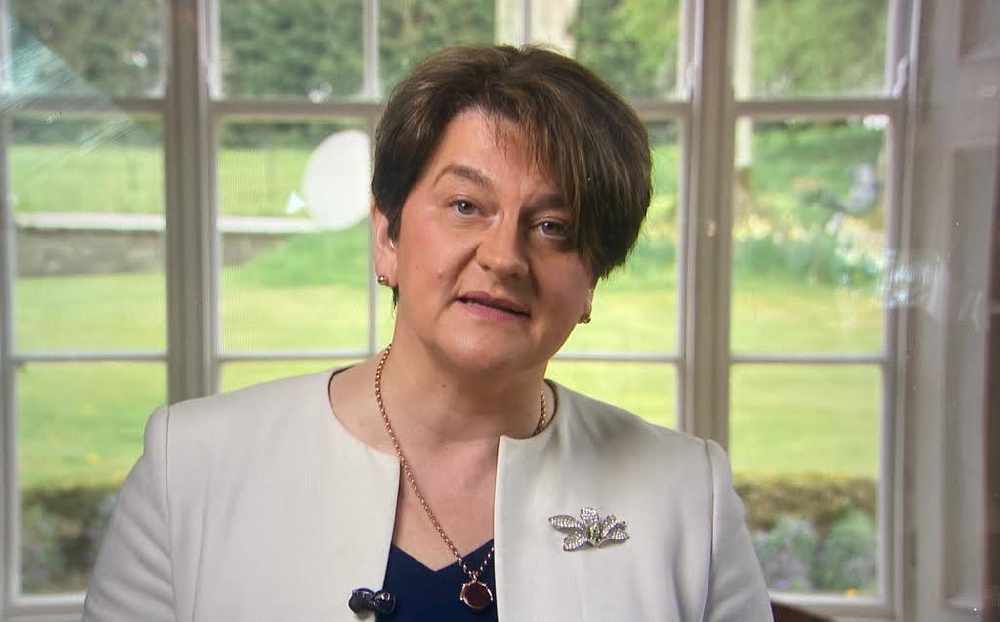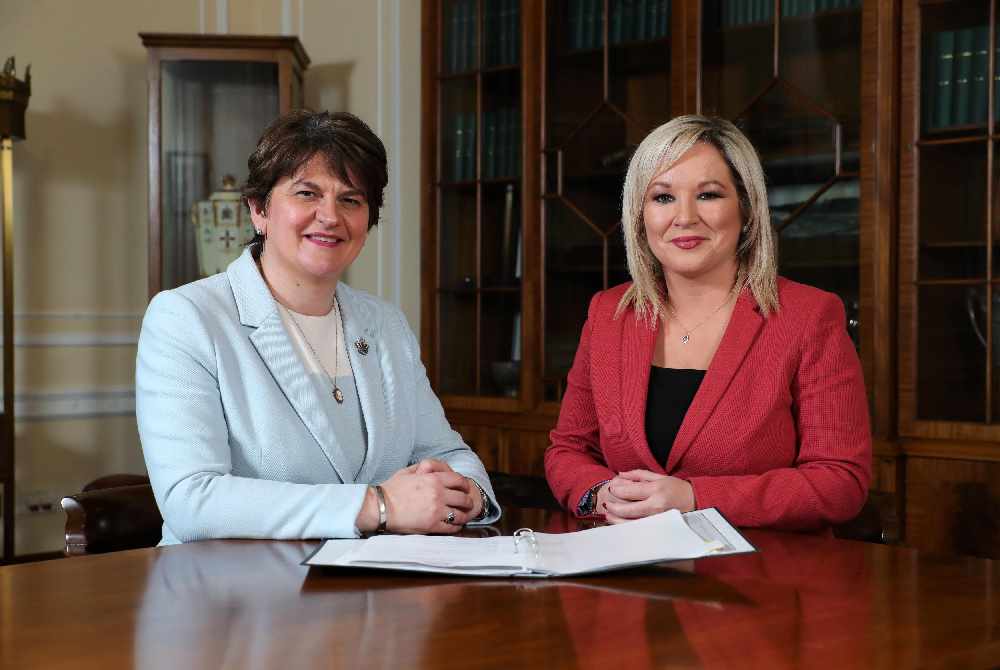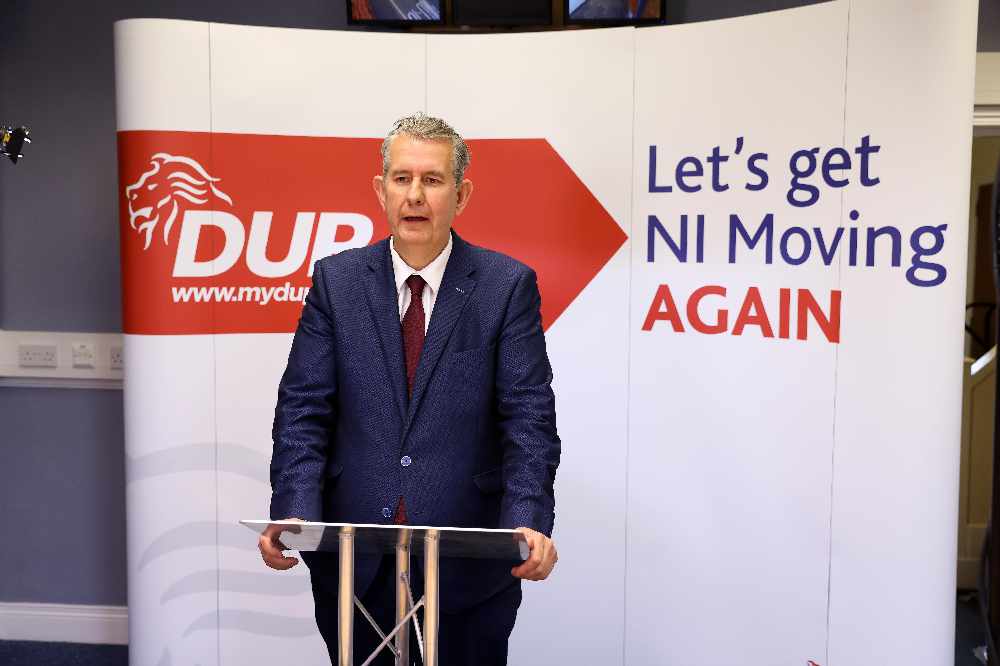
By PA
Arlene Foster is set to make a statement to the Northern Ireland Assembly at 12pm to formally announce her resignation as First Minister.
Speaker Alex Maskey has informed MLAs that Mrs Foster’s resignation will come into effect at 1pm on Monday.
That means the roles of first minister and deputy first minister will need to be filled by 1pm on Monday June 21, otherwise the UK Government will be under a legal duty to call a snap Assembly election.
Mr Maskey said: He said: “Mrs Foster has requested to make a personal statement to the Assembly and I have given her permission to do so at the start of business today under Speaker’s business.
“Under section 16B(2) of the Northern Ireland Act, if either the First Minister or deputy First Minister ceases to hold office at any time, the other shall also cease to hold office at that time.

“As Mrs Foster’s resignation takes effect from 1pm on 14th June 2021, both she and Mrs O’Neill will cease to hold office at that point.”
Meanwhile Edwin Poots is warning that a Sinn Fein refusal to nominate a Stormont deputy first minister could potentially put peace at risk in Northern Ireland.
The DUP leader's remarks come amid an intensifying dispute over the process to replace departing First Minister Arlene Foster.
A stand-off between Sinn Fein and the DUP on the vexed issue of Irish language legislation has the potential to derail the powersharing institutions unless resolution is found in the coming days.
When Mrs Foster formally quits as joint head of the devolved Executive it sets the clock ticking on a seven-day time frame within which the DUP must renominate its chosen successor, Lagan Valley MLA Paul Givan.
However, the joint nature of the office Mrs Foster shares with deputy First Minister Michelle O’Neill of Sinn Fein means Ms O’Neill must also be renominated to her role within those seven days.

If one of the parties fails to renominate within the time period, a properly functioning executive cannot be formed and the UK Government assumes a legal responsibility to call a snap Assembly election.
On Sunday, a simmering row over the process escalated when Sinn Fein made clear it would only engage in the renomination process if it was accompanied by the commencement of legislating for protections for Irish language speakers.
On Monday, Mr Poots said there could be no preconditions attached to the nomination process.
He reiterated that he was committed to implementing all outstanding aspects of the 2020 deal to restore powersharing, including Irish language legislation.
However, he declined to indicate whether he would move on the language laws in the current Assembly mandate – a Sinn Fein demand – and insisted there were other priorities the Executive should be focusing on, including the health service and economy.
“Setting preconditions is not appropriate, it’s not respecting someone’s mandate, and we cannot be in a circumstance where we have preconditions set for the selection of our First Minister. And I’m not setting preconditions to the selection of Sinn Fein’s deputy First Minister,” said Mr Poots.
“Our community is at a very tense situation at this moment in time.

“We saw riots on the streets of Belfast earlier this year. And I have serious concerns about the potential for conflict once again on our streets.
“Not only if Sinn Fein do not nominate the deputy First Minister are all of those issues not going to be served well, we are putting our very peace at risk as a consequence of that action.
“If Sinn Fein are going to play fast and loose with the very peace that people enjoy at this moment in time, then that is a very, very serious consideration for them to take. Hopefully they won’t.”
The Irish language legislation is one of several outstanding elements of the New Decade, New Approach (NDNA) deal that resurrected powersharing in Northern Ireland after a three-year impasse.
Since becoming the new DUP leader, Mr Poots, who succeeded Mrs Foster after an internal revolt forced her out, has repeatedly said he is committed to implementing all of the NDNA agreement.
Sinn Fein has however demanded specific and immediate action on the Irish language aspect, insisting the legislation must be tabled at Stormont ahead of the summer recess if it is to become law before the end of the current Assembly mandate next spring.
On Sunday, a Sinn Fein source told the PA news agency the party believed Mr Poots was being “disingenuous” in his public comments on the NDNA.
The source said Sinn Fein assessed that the DUP was “acting in bad faith”.
“We do not believe they will deliver on the Irish Language Act,” said the source.

“Our position is that the nomination for first minister and deputy first minister has to be accompanied by legislation on the Irish language.”
The cultural elements of the NDNA, which include protections for Irish and Ulster Scots speakers, would be delivered in the form of amendments to the 1998 Northern Ireland Act.
With the law changes having already been drafted as part of the NDNA deal, the draft legislation can commence its journey through the Assembly once the Executive gives it the green light.
This could be done at a meeting of the devolved administration or by way of an urgent written procedure initiated jointly by the First Minister and deputy First Minister.
The Executive cannot meet in the period between Mrs Foster resigning and a successor being confirmed in the role.
It is understood Sinn Fein would engage in the renomination process if that was followed by a swift meeting of the Executive to sign off on the language legislation.


 More than 5,000 NI children set to spend Christmas in temporary accommodation
More than 5,000 NI children set to spend Christmas in temporary accommodation
 No evidence of police collusion in 1978 La Mon bombing
No evidence of police collusion in 1978 La Mon bombing
 Sex offender who targeted girls online across the UK jailed for 27 years
Sex offender who targeted girls online across the UK jailed for 27 years
 Pre-trial rulings due in Bloody Sunday prosecution of Soldier F
Pre-trial rulings due in Bloody Sunday prosecution of Soldier F
 ‘Worst-case scenario’ could delay Belfast maternity hospital by four years
‘Worst-case scenario’ could delay Belfast maternity hospital by four years